




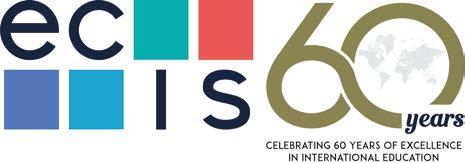

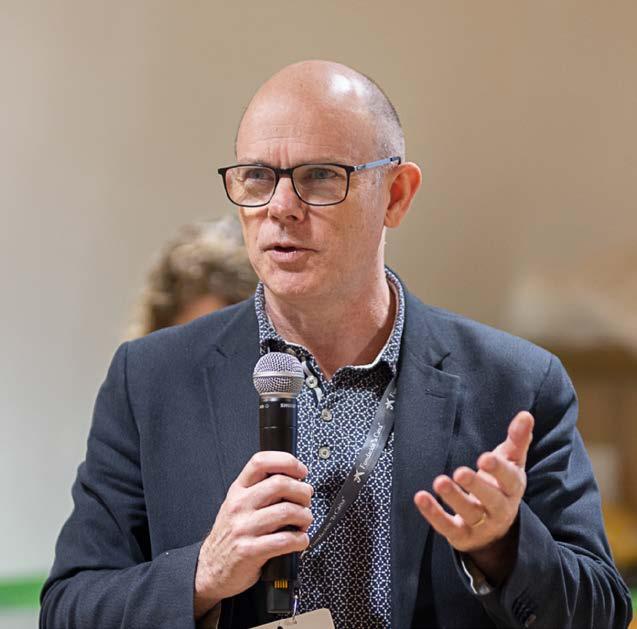
In this, our fourth edition of Leadership connections, I am thrilled to say we have partnered with the Educational Collaborative for International Schools (ECIS, see below). Working with an organisation with an international outlook, and one that hosts their own annual leadership conference, gives a new dimension to this publication.
For those of you not familiar with the work of UCL Centre for Educational Leadership (UCL CEL), thanks to the work of one of our post graduate students, Steve Seo, who created this infographic, which provides a summary of CEL activities and global reach. Leadership connections, as always, aims to inform readers about educational leadership issues around the world, and to connect us together and to a wider community of practice.
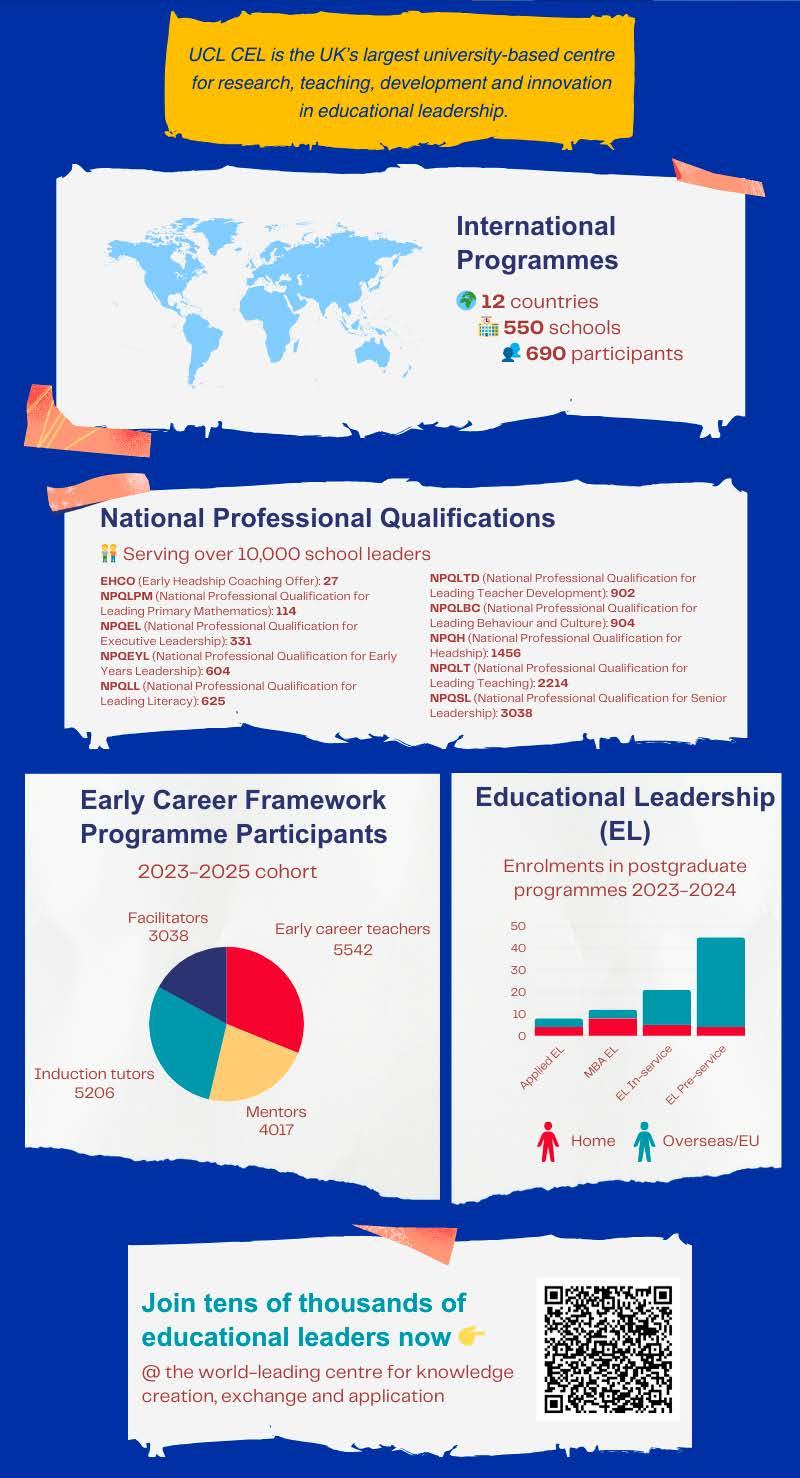
This edition is rich and varied, with articles on school collaboration, the role of education in transmitting culture and on digital influences on practice, to give a taste. We hope you enjoy reading! .
Dr David Godfrey Centre Academic Programmes Leader David.Godfrey@ucl.ac.uk
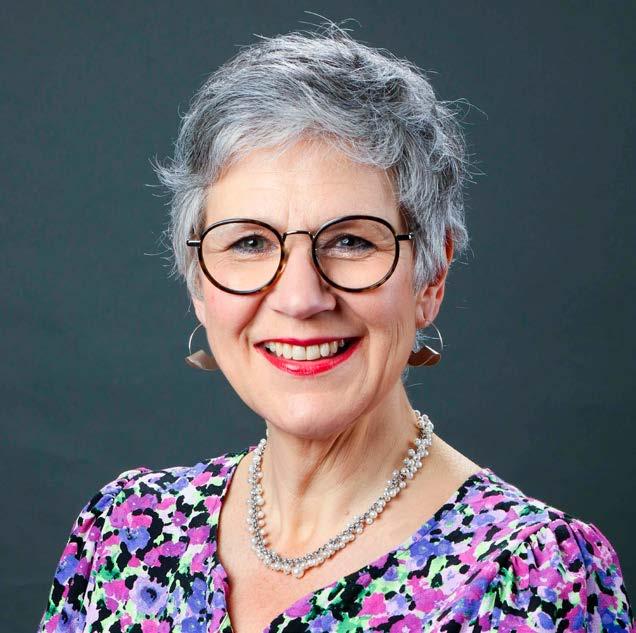
As we celebrate the 60th anniversary of ECIS (The Educational Collaborative for International Schools), we are delighted to partner with UCL Centre for Educational Leadership (UCL CEL) for this joint edition of Leadership Connections, dedicated to advancing thought leadership in educational leadership and global learning. ECIS is at the forefront of shaping international education, promoting Child Protection, Diversity, Equity, Inclusion, and Justice (DEIJ), Middle Leadership Certificate training and fostering professional growth for educators worldwide. With a network of over 500 member schools across 80 countries, ECIS is committed to building transformative learning communities that cultivate intercultural understanding and global competence. This collaboration with IOE underscores our shared mission to empower educators as leaders and innovators, advancing educational excellence in an interconnected world.
This edition comes at a special moment for ECIS as we look ahead to our 60th anniversary celebration, taking place at the Leadership Conference in April 2025. We are thrilled that articles from both ECIS and IOE will challenge, inspire, and support educational leadership thinking.
From Anja Junginger’s insights into a residency programme for early career teachers to Dr. Mary Ashun’s provocation on whether education could lead us away from our cultural roots, this issue covers a range of compelling leadership topics. Simon O’Connor’s exploration of organisational culture in schools and Beth Dewhurst and Paul Magnuson’s reflection on how AI is shaping education today further highlight the importance of this ongoing dialogue.
Sarah Kupke Head of School Relationships and Partnerships

By Anja Junginger
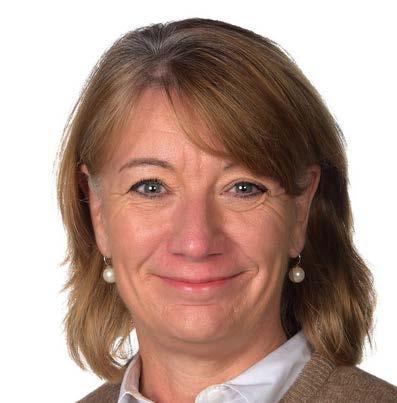
The importance of keeping educators in education cannot be underestimated. Most notably research findings such as those cited by Johnson et al in their paper
Conditions that Support Early Career Teacher Resilience (Johnson, 2010) point us to the importance of creating better induction programs that support new teachers in developing the skills and dispositions to thrive and stay in the profession. Amongst key points made are that
• early career teachers confront a serious mismatch between their ‘idealistic motivations’ and the daily realities of classroom teaching (Abbott-Chapman, 2005); and that
• too few early career teachers experience a quality induction program (Algozzine, Gretes, Queen & CowanHathcock, 2007). Most are left to ‘sink or swim’ and learn by ‘trial and error’ in their first year of teaching (Howe, 2006).
Additionally, our mid-career teachers are
another important group to focus on as we aim to create sustainability. Often the only way to progress and develop in schools is to move out of the classroom into administrative leadership positions.
What if we could develop our most excellent practitioners as leaders but keep them in the classrooms where they can have the greatest impact on student learning while also acting as role models, as ‘teachers of teaching’? School systems that excel, for example Singapore take such an approach. “Singapore invests significantly in teachers as professional learning leaders with leadership roles that recognize excellence in professional learning, helping teachers to lead professional learning within their own schools and to align teacher needs and broader school objectives” (Jensen, 2013).
Our vision at the International School of Stuttgart is that by bringing these two groups of impactful educators together that we can create more sustainability in the profession, develop greater intercultural understanding, and ultimately benefit students not only at our school, but also in the schools that our educators may transition to in the future.
The ISS Teacher Residency Program is intended to inspire, support, and challenge a diverse group of young professionals advancing on their career path as well as the ISS mentor teachers who collaborate with them. Our belief is that by enacting this learner-centered and job-embedded form of professional learning that we can lay the seeds for a culture of collaboration and self-directed learning for all learners at ISS.
The program currently supports eight residents, eight mentor teachers, and two
coordinators. Our aim is that each year these 18 educators will create patterns of motivation and energy, clarity of purpose, and a growth mindset inspired by taking an action research approach within their teams. This will ideally create an amplifying feedback loop. The program is rooted in the principles of adult learning, the IB Standards and Practices, and the NEASC ACE Learning Principles for all learners, as well as guided by the Learning Forward Standards for Professional Learning.

I learned most about how to allow self-management, open structures, student-centered sequences, inquiry-based lessons. I always struggled to find the right balance between freedom and guidance but this program has given me "best practice" lessons and ideas but also allowed me to experiment. 2023-2024 Resident Teacher

Now two years into the program, we have regularly gathered evaluative feedback so that we can iterate improvements into the structure and implementation. We used several evaluation methods including surveys, collaborative brainstorming, and focus group sessions with the residents, their mentor teachers, and school leaders. First, we wanted to find out if our success criteria were being met, for which we used a survey, asking participants to rate their agreement with the success criteria statements.
• Residents express satisfaction with the ways in which they are treated and included as members of the ISS community. Average rating 4.39 out of 5
• Residents can incorporate their prior knowledge into the program to aid and
extend their learning. Average rating 4.4 out of 5
• Residents have opportunity to collaborate based on their strengths and abilities. Average rating 4.4 out of 5
• Feedback is used to support learning, in accordance with IB philosophy. Average rating 4.2 out of 5
• The program is a holistic and coherent learning experience for residents in accordance with the principles of adult learning. Average rating 4.3 out of 5 for Mentor teachers Average rating 3.9 out of 5 for Residents
• Residents can explore their personal interests and ideas and set meaningful learning goals. Average rating 4.3 out of 5
• Mentors have opportunity to share their strengths and abilities. Finding: 4.67 out of 5
• Mentors can describe their own professional growth because of program involvement. Some examples of what was said:
"It’s made me more aware of my own practices and it's challenged me to be a better teacher since I have to model that".
"It has given me the experience to have/handle difficult conversations and made me focus on solution-based conversations".
"It has required me to reflect on my own practices, listen and learn about new ones and perspectives, and apply them accordingly".
"It has been a useful experience to stop and consider why I do things the way I do. It has provided new motivation to re-engage with research in education and to try some new things".
These ratings indicate that we are definitely on the right track, but that there is still some room for improvement.
We also asked all groups to give us two stars and a wish. Key themes that arose can be seen in these responses:
• Perhaps clearer expectations of what the teacher's role is. The freedom is nice but extra guidance beforehand would go a long way in setting out roles and responsibilities.
• Clearer expectations of the outcome of the program, possibility of residents working with more than one mentor.
• The expectations need to be agreed and clear for everyone involved / avoid mixed messages (or perception thereof).
As well as
• Make the residents and mentors more visible and enable them to contribute more to the school as a whole.
• Communicate the program more transparently.
Another important aspect that we were curious about was what impact mentor teachers thought the Resident Program was having on student learning within their classrooms. Their responses included:
• The students benefit from another educator, from an additional skillset and from another caring adult.
• Students adapt to the circumstances put forth in the classroom and see that a teacher residency and the class teacher are both approachable and inspire, challenge and support each and every student.
• Very positive. The students benefit from a male and female homeroom
teacher - they see and respect the resident as a teacher and his relationships with both students and parents are excellent.
• Time assigned to individual students is priceless, huge advantage for them, there are two of us at any given time. We can differentiate/individualize their learning.
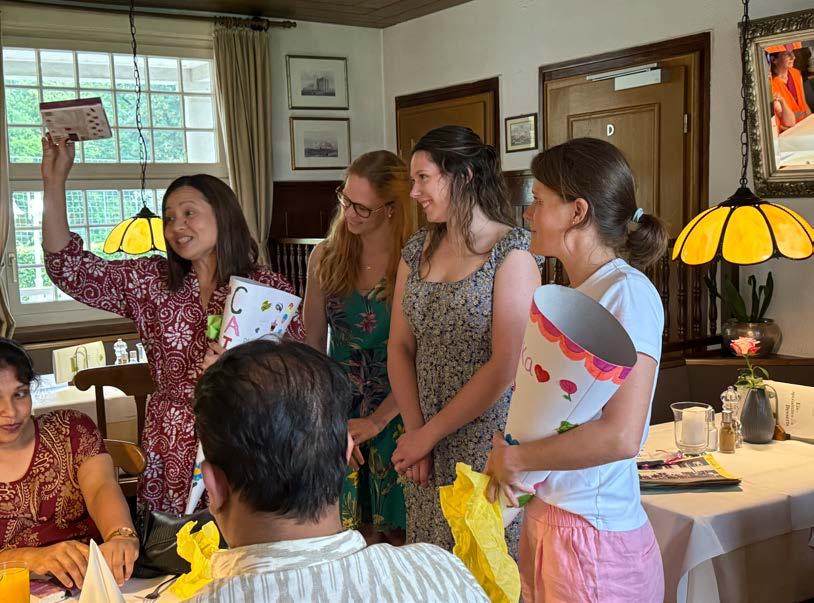
As we are continually working on developing and diversifying the program using a solution-focused design process, this feedback has been immeasurably helpful. Our first action has been to move towards a mission-driven goal, which is to diversify the program so that a greater focus can be put on promoting intercultural understanding.
For the 2023-24 cohort we were fortunate enough to hire residents from Bosnia, Kenya, the US, Germany, Canada, and Colombia. For the coming year our residents represent Tunisia, South Africa, America, and Germany. In line with this, we have developed a program mission rooted in developing intercultural understanding and learning impact. We have also made the ECIS Global Perspectives course and the Preparing for International Teaching Certificate modules a core part of our professional learning strategy.
Our next goal is to bolster the role of the mentor teacher through clearer support materials and professional growth opportunities within the school. Currently they receive ECIS MLC courses, but we want to embed this work more within the school and create more opportunities for coming together as a professional learning community. We believe that mentor teachers will benefit from reflection, sharing, and action research related to their own development as coaches and as middle leaders. We also want them to have better guidance on how to observe and give feedback on learning. In line with this, developing the skills of coteaching are a strategic priority that the program actively encourages.
For the residents, we want to continue to emphasize the focus on goal setting and evidencing learning. It is an area to strengthen and be more explicit about. The power of how we document and monitor student learning can be highlighted as we encourage our residents, and their mentor teachers, to focus on this as a vehicle to document and monitor their own growth as educators. We also want our residents to experience being in different classrooms as observers to expand their perspectives and create more touchpoints for the program in the school.
Lastly, we will place a greater emphasis on making the program and the work of the participants more visible to the community as a whole. The excellent work that is happening should be amplified more so that others might also be inspired, and the ripple effect can be maximized. Part of this visibility includes expanding the program during the 2024-25 school year to be part of a more comprehensive Early Career Teacher Program. We aim to include internships, student teaching,
second year residents, as well as first-year teacher hires into the program.
The goal is to provide a coherent experience across the first several years of a growing educator’s journey and to ensure positive and fruitful first experiences in teaching. We believe that this will be the greatest inspiration towards committing to the teaching profession. Evidence of this can already be seen in our 18 ‘Alumni’residents, 100% of whom have gotten teaching jobs in international education and/or are pursuing teaching degrees if they did not have them already.
Works cited:
"Beyond PD: Teacher Professional Learning in High-Performing Systems - NCEE." https://ncee.org/book-report/ beyond-pd-teacher-professional-learningin-high-performing-systems/, Accessed 1 Jan. 1970.
Johnson, B., Down, B., Le Cornu, R., Peters, J., Sullivan, A., Pearce, J., & Hunter, J. (2010). Conditions that support early career teacher resilience. Refereed paper presented at ‘Teacher education for a sustainable future’, the annual conference of the Australian Teacher Education Association (ATEA), Townsville, 4–7 July.

By Dr. Mary Ashun
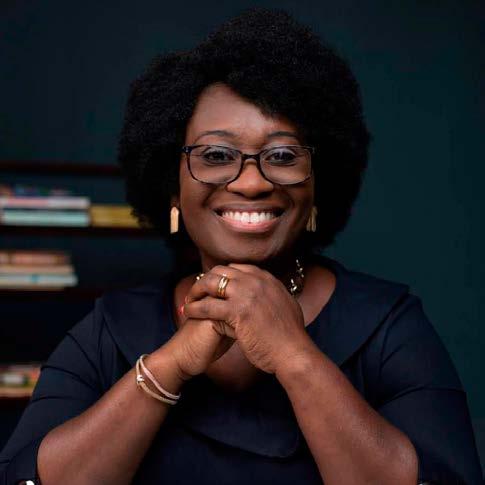
Culture, a multifaceted tapestry of beliefs, traditions, and practices, has long been considered an integral part of human existence. Yet, as societies evolve and technological advancements reshape our daily lives, questions arise regarding the transmission and relevance of cultural connections across generations. In this essay, I delve into the intersection of education, cultural identity, and societal change, exploring whether traditional cultural teachings can persist in an increasingly modernized world. Everyone desires to be better educated in whatever form that might be. Even more certain, in my experience, is that parents want their children to be as highly educated as possible. Could this come at a cost when it comes to cultural identity?
Education can play a pivotal role in shaping individuals' understanding and appreciation of their cultural heritage. From childhood, narratives, rituals, and customs are passed down through
familial, communal, and educational channels. Schools often serve as bastions of cultural preservation, knowingly or unknowingly imparting knowledge of history, language, and societal norms. However, the effectiveness of traditional cultural education in maintaining connections to heritage is subject to scrutiny, particularly in the face of evolving societal paradigms. These societal paradigms are strongly shaped by education since one is taught, as one acquires higher education, to think and question for oneself. As a result, as societies progress, cultural practices may encounter challenges in remaining relevant to contemporary life.
Take, for instance, the example of funeral rituals in Ghana, deeply ingrained in the fabric of society but increasingly questioned by younger, better educated generations. After a weekend at a funeral in one’s hometown, the car ride back to the city might be a very reflective one as one ponders all that one has seen and heard. One may start to wonder if there are different societies within the same culture and whether one has moved, subtly, from one to the other. This is when one realizes that one’s societal values may have shifted and perspectives have evolved, leaving the individual disconnected from rituals they no longer identify with or perceive as meaningful. Is this happening more than we realize?
The subtle discarding of taught cultural connections should raise fundamental questions about the purpose and efficacy of teaching cultural connections that may no longer serve the needs or beliefs of individuals. Or is it that we must expose children to all the cultural norms until they are old enough to discard at will? Do we allow adults in our society to absent themselves from rituals they no longer believe in?
In grappling with the evolution of cultural practices, a tension arises between the utility of traditional teachings and the desire for meaningful connection. Just as the slide rule gave way to the calculator, advancements in technology and societal structures are challenging the relevance of some of our cultural teachings. In mid March of 2024, thirteen African countries including Ghana experienced a major internet outage forcing everyone to marvel at how much we have come to rely on the technology that connects us, and moves money around (at many funerals in Ghana, mobile money donations were stalled; the panic was palpable).
The practice of donating money at funerals - physical cash or mobile money is a supportive one; funerals are expensive and the bereaved, in seeking to give a decent farewell to the deceased may take out bank loans to enable a send off that is talked about long after the event. If this is cultural, to what end, one might ask? What have we learned about staging a funeral? Generally, when we learn, we learn for practical utility and the joy of just ‘knowing’. When we learn cultural norms, is it because the preservation of cultural connection serves a deeper purpose in human identity and belonging? And because this deep purpose is an undeniable core of our humanity, must we preserve it through education?
In contemplating the preservation and transmission of cultural connections through education, a critical consideration emerges: responsibility. Who bears the responsibility for ensuring that individuals remain connected to their cultural heritage, and how should this responsibility be fulfilled? Responsibility is multifaceted, extending beyond individual agency to encompass the roles of families, communities, educational institutions, and
society at large. Families play a foundational role in instilling cultural values and practices from an early age, fostering a sense of belonging and identity. However, the broader community and educational institutions also share in this responsibility, serving as platforms for cultural education and intergenerational dialogue.
The conversation about cultural preservation and transmission must begin at the intersection of individual agency and societal structures. It starts with acknowledging the importance of cultural heritage in shaping individual identities and fostering a sense of belonging. This conversation must be inclusive, engaging diverse perspectives and experiences to ensure that cultural education reflects the complexities of modern society. Most importantly, it needs to be relevant and adaptable; the latter will always ensure the former.
As always, I bring this back to the classroom as I grapple with the burning question of what we must teach. Educational institutions, in particular, play a crucial role in facilitating this conversation. They must not only impart knowledge of cultural traditions but also encourage critical reflection and adaptation in light of societal changes. By fostering a dynamic approach to cultural education, educators can empower individuals to navigate the complexities of cultural identity with resilience and authenticity.
Ultimately, responsibility for preserving and transmitting cultural connections rests on each generation, but it is also a collective endeavor that requires collaboration and mutual respect. By fostering open dialogue, embracing diversity of opinions, and honoring the evolving nature of culture, we can
ensure that future generations inherit a rich tapestry of traditions while also forging new pathways for cultural expression and connection.
Now how to honour this by fitting it into an already busy timetable…
Bibliography
1. Lall, M. (2008). Educate to hate: the use of education in the creation of antagonistic national identities in India and Pakistan. Compare: A Journal of Comparative and International
2. Education, 38, 103 - 119.
3. Meşeci Giorgetti, F., Campbell, C., & Arslan, A. (2017). Culture and education: looking back to culture through education. Paedagogica
Historica, 53, 1 - 6.
4. Siegel, H. (1996). Education and Cultural Transmission/Transformation: Philosophical Reflections on the Historian's Task. Paedagogica
Historica, 32, 25-46.
5. Qoyyimah, Uswatun. (2020).
Transforming Culture Through Education. 10.4108/eai.8-9-2020.2301324.
6. Varyvonchyk, A., Voropayeva, T., Kaloian, A., Moshkina, О., & Abramovych, O. (2022). Cultural foundations of a national system of education in a COVID-19 pandemic. Revista Amazonia Investiga.
By Clare Chambers

In the era of digital expertise and artificial intelligence, many companies are working hard to accelerate their digital transformations. Amid this shift, a significant yet often overlooked issue has surfaced: fewer than one-third of executives who identify as "digital leaders" consider themselves truly competent in digital skills (DDI Global Leadership, 2021).

Research from AND Digital (2022) reveals that 81% of CEOs acknowledge the detrimental impact of this skills shortage on their businesses. Meanwhile, 65% of global hiring managers are struggling to find qualified digital talent (Sterkenberg, 2024).
Addressing key skills gaps, especially in
STEM subjects, is central to Labour’s agenda, which emphasises expanding education and training opportunities. Their goal is to create "high-quality pathways for all," ensuring young people have access to apprenticeships, higher education, and secure employment. With 92% of jobs now requiring digital skills (National Skills Coalition, 2023), equipping the next generation with these competencies is not just essential but arguably a moral imperative.
However, this initiative must also include working-age adults, many of whom are being left behind in the digital revolution — even at senior levels. Additionally, with the incremental increase in retirement age, older adults are likely to face extended working lives where digital skills will continue to be essential.
A thriving digital economy relies heavily on the strength of the VET sector (Bonoli & Gronon, 2022). Yet, ensuring the VET system meets evolving industry demands is an ongoing challenge, influenced by the rapidly shifting labour market, fluctuating government policies, and persistent funding limitations. These factors necessitate frequent updates to both digital curricula and continuous professional development of educators and leaders within the sector. In short, for the economy to fully realise its potential, enhancing digital leadership among educators and all other working-age professionals alike must be prioritised on any skills agenda.
By and large, the administration and instruction of VET programmes differ from academic programmes, as they involve employer engagement, collaboration with and recruitment of industry subject matter experts, compliance with government quality assurance standards, and a
broader range of learning facilities, equipment, tools, and materials, alongside work-based assessment strategies (Mbatha, 2021). These factors make transformational changes to management style or learning delivery mode far more complex. Leaders must mobilise and encourage active participation from sometimes resistant stakeholders to facilitate change initiatives (Cattaneo, Gurtner, and Felder, 2021), while ensuring proper implementation of regulations and best practices around provision (Majumdar & Araiztegui, 2020). Achieving this is no easy feat in a sector with equally precarious funding.
The COVID-19 pandemic made competent digital leadership essential in education, forcing the adoption of remote learning and instruction at all levels in the short-tomidterm (Camden and Bunn, 2020). Consequently, remote assessments, simulated environments, and online exams have now become accepted alternatives to traditional classroom methods in many subjects (Jurāne-Brēmane, 2023). However, many VET providers, including large colleges, report feeling disconnected from learners and underprepared to deliver apprenticeships remotely (AELP, 2021).
While McLeod and Dulsky (2021) confirm the importance of digital leadership, noting that teaching staff were largely unprepared for such crises, few studies have explored how leadership impacts staff digital competency, particularly regarding the quality of remote provision (Pettersson, 2018). Moreover, although 'train the trainer' organisations and similar education bodies offer ad-hoc sessions on trending topics, the AELP’s (2024) sector governance guidance still lacks references to digital competence at the board level.
Leadership quality plays a pivotal role in driving digital change and can either accelerate or impede progress (Carretero et al., 2017; Ifenthaler & Egloffstein, 2020). However, the literature suggests that digital leadership often falls short of the transformational standard needed across sectors. According to Iveroth and Hallencreutz (2022), many digital leadership initiatives are reactive and temporary, driven by external pressures like new competition or sudden policy changes. VET providers cannot afford to be as unprepared as they were during the pandemic. They must anticipate labour market needs, emphasising the urgent demand for educational leaders who can shape the future of digital skills and are proficient in the latest learning technologies.
At its core, digital leadership in education involves integrating digital technologies into learning practices to drive continuous improvement (Yusof et al., 2019). Definitions vary, but most emphasise influencing others, initiating sustainable change, and preparing for future shifts (Rusnati and Gaffar, 2020). In most research on educational leadership, the term ‘digitalisation’ is apparently preferred as it best describes the multifaceted implications that arise out of the adoption and diffusion of educational technology. Some researchers argue that strategic leadership is key to navigating the uncertainties of the 'fourth industrial revolution' (Nababan et al., 2020; Elkordy and Iovanelli, 2020). However, the frequent use of ambiguous and interchangeable terms related to digitalisation (Kimachia, 2023) only adds to the confusion in organisations.
Routes to Leadership in VET Leadership in non-college VET settings,
especially independent training providers (ITPs), is often overlooked, despite their significant market share—controlling 66% of the VET market in England and delivering 75% of apprenticeships (AELP, 2023). Leaders in ITP settings typically come from external roles, such as industry or other providers, or progress internally through operational roles (Greatbatch and Tate, 2018). Recruiting leaders from outside the sector is often seen as beneficial, bringing commercial insight and fresh perspectives (FETL, 2016).
As key decision-makers, VET leaders are directly accountable for driving change (Yani et al., 2021). They must understand various perspectives within their organisations and communicate effectively in the 'languages' of their staff (Mulcahy, 2004). However, as teachers transition into leadership roles, they often shift focus from pedagogy to leadership responsibilities, making learning-centred leadership essential (Bush, 2018). Hargreaves and Fink (2006) emphasise the importance of 'deep and broad' learning at the leadership level, ensuring that learning is central to every decision and policy.
VET leaders need a unique blend of pedagogical expertise and occupational experience to prepare learners for the future labour market. However, the skills required for effective teaching differ from those needed for leadership (ETF, 2014). The importance of digital literacy for educators has grown dramatically (Gibson and Ifenthaler, 2018; Singh, 2021), and leaders must set the example by promoting digital tools and resources.
A study by Hamzah et al. shows that leaders who encourage professional development boost others' confidence in digital education practices (2021). Digital leadership
involves not only technical know-how but also softer skills such as political acumen, emotional intelligence, and 'futures thinking' (Fink, 2010). As Sheninger (2019) notes, today's educational leaders must also possess commercial skills like public relations and brand management, facilitating their role as 'agents of change.' By cultivating digital leaders who can navigate both the technical and human elements of leadership, the VET sector can ensure it is equipped to meet the demands of the evolving digital economy.
To achieve Labour's vision of a future-ready workforce, strong digital leadership must become a core priority across the education and training sectors. As digital skills become non-negotiable in nearly all professions, leaders must take proactive steps to ensure that learners, young and old, are prepared for the demands of a tech-driven economy. This requires not only updating curricula but also fostering an environment where digital literacy is embraced at all levels of leadership, teaching, and learning.
The potential impact of effective digital leadership clearly extends far beyond the classroom. By cultivating leaders who can anticipate industry shifts and champion digital innovation, the UK can secure its place as a global leader in the digital economy. Strong digital leadership within VET and beyond will bridge the skills gap, drive productivity, and ultimately position the UK to thrive in a competitive, rapidly evolving world.
References
AND Digital. (n.d.) Lack of digital skills jeopardising business growth. Available at: https:// www.and.digital/spotlight/lack-of-digital-skills-jeopardising-business-growth (Accessed: 10 September 2024).
Association of Employment and Learning Providers (AELP), 2024. Good governance guide. Available at: https://www.aelp.org.uk/media/dwzdduzg/aelp-good-governance-2024.pdf (Accessed 11 September 2024).
Association of Employment and Learning Providers (AELP). (2023) AELP relaunches code of good governance for independent training providers. Available at: https://www. aelp.org.uk/news/aelp-relaunches-code-of-good-governance-for-independent-trainingproviders/ (Accessed: 11 September 2024).
Bonoli, L. and Gonon, P. (2022) 'The evolution of VET systems as a combination of economic, social and educational aims. The case of Swiss VET,' Hungarian Educational Research Journal, 12(3), pp. 305–316. DOI: 10.1556/063.2021.00062.
Bush, T. (2018), 'Preparation and induction for school principals,' Management in Education, Vol. 32/2, pp. 66-71, doi: 10.1177/0892020618761805.
Camden, B. & Bunn, K. (2020) in FE Week, Remote assessment guidance for apprentices open to Malpractice. [Online] Available at: https://feweek.co.uk/home-assessment-guidance-too-vague-and-open-to-malpractice-say-awording-bodies/ (Accessed: 09 September 2024).
Carretero, S., Vuorikari, R., & Punie, Y. (2017). DigComp 2.1: The Digital Competence Framework for Citizens with eight proficiency levels and examples of use. Publications Office of the European Union, doi: 10.2760/38842.
DDI (2021) Global leadership forecast 2021. Available at: https://www.ddiworld.com/global-leadership-forecast-2021 (Accessed: 10 September 2024).
Education and Training Foundation (ETF) (2014), 'Leadership Pipeline, Phase Two: Leading from the Middle: A Research Report,' Sheffield: ETF.
Elkordy, A., Iovinelli, J. (2021). 'Competencies, Culture, and Change: A Model for Digital Transformation in K-12 Educational Contexts.' In: Ifenthaler, D., Hofhues, S., Egloffstein, M., Helbig, C. (eds) Digital Transformation of Learning Organizations. Springer, Cham. DOI: 10.1007/978-3-030-55878-9_12.
Fink, D. (2010) 'Developing and sustaining leaders of learning,' in B. Davies and M. Brundrett (eds) Developing Successful Leadership. New York: Springer.
Further Education Trust for Leadership (FETL) (2016) Leadership and ethics in further education. [Online] Available at: https://dera.ioe.ac.uk/id/eprint/34010. (Accessed 10 September 2024).
Gibson, D. C., & Ifenthaler, D. (2018). 'Analysing performance in authentic digital scenarios' in T.-W. Chang, R. Huang, & Kinshuk (Eds.), Authentic learning through advances in technologies (pp. 17–27). New York: Springer.
Greatbatch, D. and Tate, S. (2018) Teaching, leadership and governance in Further Education. [Online] Available at: https://assets.publishing.service.gov.uk/ media/5a7c441bed915d76e2ebc33f/Teaching__leadership_and_governance_in_Further_Education.pdf (Accessed: 09 September 2024).
Hamzah, N. H., Nasir, M. K. M. and Wahab, J. A. (2021). 'The Effects of Principals’ Digital Leadership on Teachers’ Digital Teaching during the Covid-19 Pandemic in Malaysia.'
Hargreaves, A. and Fink, D. (2006) 'Sustainable Leadership,' San Francisco, CA: John Wiley. Journal of Education and e-Learning Research, vol. 8, no. 2, pp. 216–221, doi: 10.20448/journal.509.2021.82.216.221.
Ifenthaler, D. and Egloffstein, M. (2020) 'Development and Implementation of a Maturity Model of Digital Transformation'. TechTrends 64 (2): 302-309.
Iveroth, E. and Hallencreutz, J. (2022) Leadership and Digital Change: The Digitalization Paradox (2022). Routledge.
Jurāne-Brēmane, A. (2023) 'Digital Assessment in Technology-Enriched Education: #Thematic Review,' Education Sciences, 13(5), p. 522. DOI: 10.3390/educsci13050522.
Kimachia, K. (2023) What is digitization vs digitalization vs digital transformation? Channel Insider. [Online] Available at: https://www.channelinsider.com/business-management/digitization-vs-digitalization/ (Accessed: 10 September 2024).
Microsoft (2023) Global knowledge study reveals present and future skills issues facing IT departments worldwide. Available at: https://pulse.microsoft.com/en/skill-forward-en/ na/fa1-global-knowledge-study-reveals-present-and-future-skills-issues-facing-it-departments-worldwide/ (Accessed: 10 September 2024).
Mulcahy, D. (2004) 'Making managers within post-compulsory education: policy, performativity and practice,' Research in Post-Compulsory Education, 9(2), 183-202, DOI: 10.1080/13596740400200174.
Nababan, T. M., Purba, S., & Siburian, P. (2020) 'The Challenge of Being a Teacher in Industrial Revolution 4.0.' The 5th Annual International Seminar on Transformative Education and Educational Leadership (AISTEEL 2020), 219–223.
National Skills Coalition (2023) New report: 92% of jobs require digital skills, one-third of workers have low or no digital skills due to historic underinvestment, structural inequities. Available at: https://nationalskillscoalition.org/news/press-releases/new-report-92-of-jobsrequire-digital-skills-one-third-of-workers-have-low-or-no-digital-skills-due-to-historicunderinvestment-structural-inequities/ (Accessed: 11 September 2024).
Pettersson, F. (2018) 'On the issues of digital competence in educational contexts – a review of literature.' Education and Information Technologies, 23(3), 1005–1021. DOI: 10.1007/s10639-017-9649-3.
Rusnati, I. and Gaffar, M.F. (2020) 'Implementation of Principal’s Digital Leadership in Communication and Teacher Professional Development at School,' in Proceedings of the 4th International Conference on Research of Educational Administration and Management (ICREAM 2020), vol. 526, pp. 90–95, doi: 10.2991/assehr.k.210212.018.
Sheninger, E. (2014) Pillars of Digital Leadership; International Center for Leadership in Education: Rexford, NY, USA. Available.
Singh, M. N. (2021) 'Inroad of Digital Technology in Education: Age of Digital Classroom.' Higher Education for the Future, 8(1), 20–30. DOI: 10.1177/2347631120980272.
The Association of Employment and Learning Providers (AELP) (2021) Excellence for learners, value for employers. [Online] Available at: https://www.aelp.org.uk/ media/5xihy1es/itp-research22.pdf (Accessed 08 September 2024).
Yani, N.A., Kristiawan, M. and Martha, A. (2021) 'Leadership of the principal in improving the professional competence of teachers in the digital age,' JPGI (Jurnal Penelitian Guru Indonesia), 6(1), p. 268. DOI: 10.29210/021040jpgi0005.
Yusof, M.R, Yaakob, M.F.M. and Ibrahim, M. Y. (2019) 'Digital leadership Among School Leaders in Malaysia,' Int. J. Innov. Technol. Explor. Eng., vol. 8, no. 9, pp. 1481–1485, doi: 10.35940/ijitee.i8221.078919.
By Beth Dewhurst and Paul Magnuson
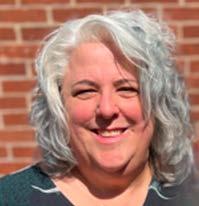

Beth Dewhurst, Faculty Member and Mentor in Moreland University‘s TEACH-NOW Online K12 Certification and Master’s of Educational Technology :rogrammes; Paul Magnuson, Educational Research Director at Leysin American School.
This article first appeared in the January 2023 edition of ECIS Insightful. In this update, we reflect on our initial understanding of ChatGPT and offer a few observations about how it and generative AI (genAI) is shaping education today.
It is (still) impossible to keep up with the flood of blogs, podcasts, and scholarly articles about ChatGPT. Provocative article titles and opinions like The College Essay is Dead (Marche, 2022) and The End of High School English (Hermon, 2022) have helped drive current interest, as has the quick and easy access to test the conversational chatbot oneself.
ChatGPT is amazing, quickly producing decent, if formulaic, text. Stephen Marche (Frankel, 2023) thinks the texts it produces are solid high school Bs, banal but formulaic like much of the writing required in high school (Frankel, 2022). He also claims that the product of some other text
generators may outperform ChatGPT as the technology advances. Whatever is best, however best be defined, will likely be eclipsed by newer versions that perform what they are designed for that much better. You get the picture. Over a year ago, we imagined that what astounded us about ChatGPT would appear amateurish down the road. The chatbot has exceeded our initial musings by scoring in the 90th percentile of the Bar Exam (Journal, 2023), serving reliably as a personal consultant for travel, nutrition, and any number of roles, and writing (and debugging) code.
Predictably, many early reactions included fear and a tendency to exaggerate the possible impact AI written text could have on curriculum, instruction, and assessment (Kovanovic, 2022; Spencer, 2022). Amid the early ChatGPT craze, many of us were curious whether or not current plagiarism tools will be able to detect text written by chatbots (Mollenkamp, 2022) and, the technology being new, we were asking if using a chatbot is plagiarism (Frankel, 2023). After all, it is not misrepresenting the writing of another person as one’s own.
If it’s true that “the product a student provides may no longer provide genuine evidence of their achievement of the course outcomes” (Kovanic, 2022), something has got to give. Many schools and districts will decide that the best approach is to block the technology, an approach originally taken by the New York City Education Department (Chalkbeat, 2023).
They reversed their policy in May 2023. Blocking technology is of course unrealistic, since student access to technology extends far beyond the control of a school or district. “... banning
ChatGPT is a bit like mandating abstinence-only sex education,” writes Sarah Dillard. “It may be well-intentioned, but it’s not going to be effective, and it’s certainly not going to prepare students for the real world” (2023).
So educational practice may need to change and adapt. Perhaps chatbots are “ …exposing the essential problems with student writing and writing instruction in K-16 education” (Thomas, 2022). Thomas continues:
“If AI-generated writing can produce passages or even entire essays that meet the expectations of assignments in K-16 education, we shouldn’t be flailing our arms and racing around in Apocalyptic panic because that is a signal that the type of writing students are assigned and the writing they are taught to produce weren’t very good to begin with.”
And, these days, there’s a new AI detection tool and a counteroffensive humanizing tool around every corner. This is another area that requires caution, since tools that record and timestamp their learning products can be undermined, too. In a recent virtual AI certification course, founder and CEO of AI for Education Amanda Bickerstaff cautioned that schools relying on AI detection tools may make themselves vulnerable for litigation due the frequency of false positives and related issues.
How then do we propose to leverage chatbot technology for the good of instruction?
One suggestion is that teachers will “use ChatGPT essays as examples of mediocre writing that they’ll assign their students to edit and improve” (Coleman, 2022). Some form of this approach seems plausible,
at least until the technology is no longer mediocre, and we would wager that the technology is already good enough to make distinguishing banal chatbot writing and formulaic student writing both time consuming and counterproductive. More realistic is perhaps to embrace the technology, meaning the use of “... AI tools to conduct subject-domain tasks should be part of the educational goals in the future. Education should focus on improving students’ creativity and critical thinking rather than general skills” (Zhai, 2022, p. 10).
A helpful framework for approaching AI with students is Jeremy Caplan's AI Checklist (Course Hero, 2023). Concise and accessible, it helps educators and student’s approach use AI ethically and creatively. As part of a course syllabus, it could ground the conversation about expectations and the learning activities that follow. In the last year, we’ve noticed two extremes in our higher ed learners. Some fear using AI due to the possibility of accidental plagiarism or missing an error in what is generated (and for these reasons we advise genAI not be used if prior knowledge is low).
Others attempt to submit AI-generated text they’ve copied and pasted into the document they submit. Typically, this is easily spotted. One approach is to ask the student if the suspected text is AI-generated without attribution and offer an opportunity to redo the assignment using the framework’s expectations. So far, every learner we’ve spoken with has admitted the inappropriate use of AI and has resubmitted work that both cites AI use and more fully reflects their own thinking. While not foolproof, we’re finding that this is one way to cultivate academic integrity when integrating AI with learning.
Some pedagogical purposes might include using chatbots to generate discussion about themes, to develop argumentation, and to generate ideas in creative writing (Parker, 2022). Marche mentions a friend who is generating children’s stories in a foreign language his child is learning, based on characters the child likes (Frankel, 2023). Instead of using school materials made for a general audience, this father is creating personalized materials. Perhaps that example hints at school materials of the future, how they are created, and how they support motivation and differentiation.
Even now, educators can quickly create engaging videos presented by an avatar of their choice that includes text and images, like Synthesia or HourOne.
Thomas (2022) suggests that “a key way to encourage student engagement in writing and learning to write is to de-grade the writing process,” a sentiment echoed by Frankel (Frankel, 2022) and Zhai (2022), who suggests that “educators may have to consider innovative formats of assessments, particularly those that could carry out creativity and need critical thinking” (p. 10).
Stephen Marche sees opportunity in AI created text. While the chatbot is trained in such a way that “answers can come across as natural-sounding and human-like,” Hurst (2022) feels that a tool like ChatGPT is currently best at “banal answers” (Frankel, 2023) and that humans are not likely to be replaced, nor will there be no need to teach writing. Banal writing, as he calls it, is unfortunately “how so much of our education is driven toward,” but here there is cause for optimism. If we need
to teach what the chatbot cannot do, it is time then to change teaching and learning so that we are not focusing on banal writing. Paraphrasing what his son had to say about the chatbot's influence on teachers and schools: Instead of teaching you how to write like a machine, they're going to have to teach you to write like a human being.
At least for now.
References
Chalkbeat. (2023), January 6). Communications of the ATM. NYC Education Dept. Blocks Chatbot on School Devices, Network. https://cacm. acm.org/news/268457-nyc-educationdept-blocks-chatgpt-on-school-devices-networks/fulltext#:~:text=Blocks%20 ChatGPT%20on%20School%20 Devices%2C%20Networks,By%20ChalkBeat&text=New%20 York%20City%20students%20 and,networks%2C%20agency%20officials%20confirmed%20Tuesday.
Coleman, C. (2022, December 19). Forbes. ChatGPT Gives Writing EdTech Its Moment. https://www.forbes. com/sites/colettecoleman/2022/12/19/ chatgpt-gives-writing-edtech-itsmoment/?sh=6351ca9552c1
Course Hero. (2023, December). FREE template: Download the Ethical Learner Checklist for your syllabus to help students navigate #GenAI with confidence next year. https://www. linkedin.com/posts/coursehero_syllabusessentials-the-ethical-learner-activity7142876242352947200-Kly5/?utm_ source=share&utm_medium=member_ desktop

Dillard,S. (2023, January 4). The 74. Schools Must Embrace the Learning Disruption of ChatGPT. https://www. the74million.org/article/schools-must-embrace-the-looming-disruption-of-chatgpt/ Frankel, B. (Host). (2022, December 12). How will AI Affect Education? Part 1 (No 89) [Audio podcast episode]. In Overthrowing Education. https://www.overthrowingeducation.com/episodes/episode89-how-will-ai-effect-education-part-1
Frankel, B. (Host). (2023, January 9).
Stephen Marche: How will AI Affect Education? Part 2 (No 91) [Audio podcast episode]. In Overthrowing Education. https://www.overthrowingeducation.com/ episodes/episode-91-stephen-marchehow-will-ai-affect-education-part-2
Hermon, D. (2022, December 9). The End of High School English. The Atlantic. https://www.theatlantic.com/technology/ archive/2022/12/openai-chatgpt-writinghigh-school-english-essay/672412/
Hurst, L. (2022, December 15). Euronews. next. ChatGPT: Why the Human-Like AI Chatbot Suddenly Has Everyone Talking. https://www.euronews.com/ next/2022/12/14/chatgpt-why-the-humanlike-ai-chatbot-suddenly-got-everyonetalking
Journal, A. (2023, March 16). Latest version of ChatGPT aces bar exam with score nearing 90th percentile. ABA Journal. https://www.abajournal.com/web/article/ latest-version-of-chatgpt-aces-the-barexam-with-score-in-90th-percentile
Kovanovic, V. (2022, December 15). The Conversation. The Dawn of AI Has Come, and Its Implications for Education Couldn’t Be More Significant. https://theconversation.com/the-dawn-of-ai-has-come-and-

its-implications-for-education-couldnt-bemore-significant-196383
Marche, S. (2022, December 6). The Atlantic. The College Essay is Dead. https://www.theatlantic.com/technology/ archive/2022/12/chatgpt-ai-writing-collegestudent-essays/672371/
Mollenkamp, D. (2022, December 21). Can Anti-Plagiarism Tools Detect When AI Chatbots Write Student Essays? https:// www.edsurge.com/news/2022-12-21-cananti-plagiarism-tools-detect-when-aichatbots-write-student-essays
Parker, K. (2022, December 8). ChatGPT Could Be Writing Students’ Homework. Tes Magazine. https://spencerauthor.com/ human-skills/
Spencer, J. (2022, December 9). Human Skills in a World of Artificial Intelligence. https://spencerauthor.com/human-skills/
Thomas, P. L. (2022, December 15). It’s the End of Writing as We Know It, and I Feel Fine. https://radicalscholarship. com/2022/12/15/its-the-end-of-writing-aswe-know-it-and-i-feel-fine/
Zhai, X. (2022, December). ChatGPT User Experience: Implications for Education. https://www.researchgate.net/publication/366463233_ChatGPT_User_Experience_Implications_for_Education

By Simon O’Connor

Simon O’Connor, Director of Deira International School, explains how lessons from organisational culture in the corporate world can be applied to school settings.
‘A school leader needs to negotiate the minefield of competing values and understand the social reality of its members in order to arrive at a cohesion which enables the school to function efficiently’ (Hill).
One of the criticisms which is often levelled at school leaders and system leaders is that strategy and policy developments are perceived as being “too corporate “. Quite rightly, the education industry regards itself as being different to the corporate world. The ambition for business is to make profit whereas in education our ambition is much more holistic – to teach young people the values and skills that they will need to thrive for the rest of their lives. However, on occasion, this rejection of
the corporate perspective can mean that we miss out on valuable lessons. Following the banking crash at the start of this century many corporate institutions went back to review their purpose and the values which underpin their work. For example, NatWest produced their ‘Code’ –an explanation of their values which then sets out the behaviours that are expected when employees are living their values in their everyday work. This approach is not uncommon in industry and, indeed, has been a subject of interest since the 1980s.
One writer on organisational culture is Simon Sinek. The bestselling author of ‘Start with Why’, ‘Leaders Eat Last’, ‘Together is Better’ and ‘The Infinite Game’, Simon Sinek has helped and inspired organisations worldwide to reach new heights, while his TED talk, based on ‘Start with Why’, is the third most popular video of all time on TED.com, with more than 35 million views.
Although discussing the corporate, business world Sinek’s approach seems to fit perfectly with many of the contradictions that exist in education. Indeed, his perspective on the finite vs infinite game seems to resolve conflicts which have exist within certain elements of school.

An important basis for understanding is what Sinek describes as the distinction between the finite and infinite game. In a finite game the rules are clear, and the requirement for victory is understood by all. Furthermore, it is also clear who the opposition is. A good example would be a game of football. There are clear rules, which are policed, by which everyone must abide. It is clear who the opposition are –they are even colour coded for clarity.
Finally, everyone knows that the team who has scored more goals by the end of the match has won. After 90 minutes a clear winner emerges from these criteria. In an infinite game, these elements do not exist – there are no clear rules in which the different sides engage, indeed it is not clear who the other players are. There is no timescale as it is never ending, and no winner. Indeed, the only requirements in an infinite game are to keep playing and to do better.
Within this definition education can only be an infinite game – how can we tell when a school has won? Even if this were possible, surely the loss required for a win would depend on students underachieving, a consequence which no-one would advocate. If this is then understood, it makes little sense for schools to compete. All schools are different and pertinent to thought own context. Although we all do it, comparisons between schools are revealed to be at best meaningless and at worst a waste of both time and resources. The consequence of this is that schools should use this time to focus on what will continue to improve what they do.
However, Sinek does raise the concept of the ‘Worthy Rival’ – a supposed competitor that you know does something or somethings better. He argues that in order to improve, it is important to recognise when another organisation does something better than you, to seek to understand how and then adopt this performance for yourself.
This is simply an articulation of the oft used ‘Sharing good practice’ which is so common within schools but seemingly frowned upon between them. If schools, and owners, were able to recognise that schools are not able to compete but can all contribute to the wider performance for children, just imagine what could be achieved.
Sinek also discusses the need to focus on wellbeing, particularly the need for staff to know that their voices are heard. Sinek uses the example of someone he talked to in a US hotel who was able to explain in real detail about how much he loved his job. However, the same person had an identical role in another hotel but hated it.
The difference was that he felt heard, included and valued. In recent years, schools have started to consider wellbeing as a consideration, but this has accelerated markedly as a consequence of schools’ responses to COVID and lockdowns. We are all familiar with ‘student voice’ and gaining staff feedback – but Sinek identifies this importance of this. With declining numbers of teachers and leaders, as well as increasing generations of staff who expect their views to be heard, this is now a clear opportunity for schools to embrace a culture where all feel included. Moving an organisation’s culture is never easy and takes time. Indeed, as Leithwood et al observed,
“In the best schools, with the best resources, and the most skilled leadership, the timeframe for transforming culture, structure, belief and practice is years.”
However, as Sinek demonstrates, learning lessons from the corporate world can help schools to accelerate this process and improve student outcomes.

Interview by Mamta Ondhia
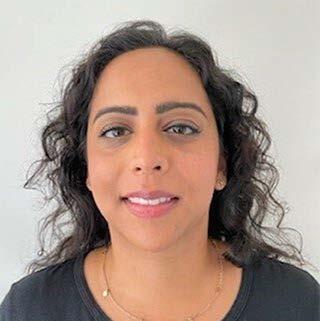
David Godfrey is an Associate Professor based at the Centre for Educational Leadership, UCL.
Mamta Ondhia is a Principal Lecturer based at BPP University and a student on the MBA Educational Leadership (International) programme, UCL.
In this article Dr David Godfrey discusses his involvement in a global school peer review project through UCL’s Knowledge Exchange Programme, and supported by The Education Development Trust’s Schools Partnership Programme, based in the UK, ‘la Caixa’ Foundation, based in Spain, and Vrije University, based in the Netherlands.
The project involves involve six head teachers from England, Spain and the Netherlands taking part in a school peer review programme. The main areas the project focused on are:
• Peer-to-peer school collaboration, with a special emphasis on the seamless integration of academic research into this process
• Transnational school peer reviews, exploring the potential benefits and best practices of international peer review
• Optimal implementation of collaborative learning in schools, promoting a deeper understanding of how to effectively implement peer-topeer collaborative learning. (EDT, pg 1, 2024)
Thank you for talking to me about this project. Firstly, please can you explain how the project got started?
My work is largely concerned with bridging the gap between academia and practice for the improvement of schools and the education system. In 2023, I finished the report of a multi-year evaluation of the Education Development Trust’s Schools Partnership Programme, independently evaluated by a team of researchers at UCL.
In total 422 schools engaged in that programme and several quite interesting findings emerged. The three that were most relevant to this project were about the integration of research evidence into the processes that schools use, the potential of transnational collaboration and investigating how to have greater impact on teacher classroom practise (rather than schools’ leadership).
So, that's where the idea came from and because I had already been working with colleagues in the Netherlands and Spain, I asked them if they were interested in participating in this knowledge exchange programme. Each partner organisation contributed in-kind funding for their own participants and for two school leaders to attend from each country.
It is important to note that this a knowledge exchange project, not a research project. It is about deriving impact from the evaluation of the Schools’ Partnership Programme.
The project consisted of three visits, one to each partner country. We visited a school in Essex, England in January 2024, two schools in the Netherlands in March 2024 and a school in Spain in June 2024. At each visit we reviewed specific school practices, and school leaders came together and explained their way of working.
A particular focus was on the research and evidence underpinning the teaching practices that they used in their schools. Each visit had unique elements, in England we focused on observing parts of a peer review in an Essex school, in the Netherlands we had talks from school leaders, teachers and agencies funded by the government, and in Spain we attended the final conference of a 30-school collaborative school project hosted at the Natural History Museum in Barcelona.
The visit to Spain also included a talk from an academic, and another from a member of the regional government of Catalonia, on how they are developing schools through research informed practices.
Can you give some examples of teaching and leadership approaches you saw during the visits that have been impactful for the participants?
During the first leg we visited a school in Essex. We looked at an improvement workshop, where another school gets coached by their partners to think about how they could improve their school. The Spanish visitors were pretty much bowled over by it as it wasn’t something they had seen before in their own country. It was the same with the Dutch visitors because they do not have this type of school-to-school collaboration. For the Spanish Headteachers, it was so impactful that they incorporated it into their own school triad practice.
Then when we went on the second visit which was to the Netherlands, we were given explanation of the Ontwikkelkracht programme, which means development power, a multi-faceted school improvement project that aimed to help schools integrate research into their teaching practice. That was fascinating and several of the visitors from England were very keen to try elements of it out in their own schools. Later we had a talk form the leerKRACHT foundation, which means teacher power. It is used in over 1,000 schools and is a methodology for engaging teachers in regular collaborative work to improve their practise.
Something that I found interesting was a session at a school in the Netherlands in which the Head Teacher was joined by 8-9 students sitting in a circle to discuss some of the things they were doing. This process of metacognition whereby the students learn to understand the learning process is strongly supported by research; but it's
also very practical in enabling students to set learning goals and then reflecting on them regularly.
Another experience that was interesting was the difference between the classroom set up in England versus the Netherlands. In England the classrooms are mostly covered in pictures and learning materials. However, in the Netherlands we visited a classroom that was largely bare. The walls were all white, clean and crisp. They told us that the classroom design is based on cognitive science, and they have considered the idea of cognitive overload whereby if children are bombarded with other images in the classroom, then it can be a distraction from their learning.
In Spain the experience was equally transformational. As it was the last leg of our knowledge exchange programme, this led to much professional discussion among participants. The commitment of school leaders to a peer enquiry process was absolutely evident, as was the desire to continue collaborating using this methodology beyond the funding period of the project. The need for a supportive infrastructure was mentioned too, and the role of expert facilitators was highlighted.
You mentioned before that your previous research indicated there was scope to explore peer review in a transnational context. How has the international element of this project contributed to the impact?
I think the international element has allowed the participants to get out of their own echo chamber to compare their
experiences. Conversations ranged from Ofsted and its equivalent or non-equivalent forms of assessment of school success, to what schoolchildren in each country eat for lunch and whether the staff sit with the children for lunch. Those discussions allowed the participants to consider how and why they do taken-for-granted practices and to consider alternatives.
So, there are the six head teachers involved in the programme, two from each country. I think one of the questions we'll have at the end will be ‘Has there been any impact on what you're going to do in your schools or your own networks of schools’. That is something we will look at in the next stage.
There are some initial discussions about collaboration between leerKRACHT Foundation and the Schools Partnership Programme about combine school to school collaboration in the latter with collaboration between teachers in schools of the former programme. If you put the two programmes together, you've got a whole school improvement programme which includes collaboration, leadership and teacher improvement. A powerful mix.
One of the aspects that we are were looking at as area of impact is still whether we could facilitate groups of schools to participate in similar projects to conduct transnational peer review. So perhaps we get three to five schools in three different countries working in collaboration without the additional funding and infrastructure that this project required. It could be online which would reduce expense and eliminate geographical restrictions. I have
also been touch with a group of schools in Australia and a region in Brazil that has been developed a peer review methodology who might wish to participate. We’re looking to develop, with the Education Development Trust, a toolkit for conducting transnational peer review to facilitate this.
Are there any reflections that you take away from the project so far?
It's an interesting question because I'm normally quite critical and self-reflective about things and it's hard to think of anything negative really. The project has worked really swimmingly because I didn’t have to direct a programme across three countries. It worked like a peer review whereby the host partners did most of the organisation. That freed me to go to the visits as a participant who was learning as much as I was contributing to the learning of others. I have really appreciated that.
The project has exceeded my expectations, and we’ve had even more people involved than I had anticipated because some have funded themselves. For example, we had a Professor from Chile joining us in Spain. Chile has been going through reforms to the accountability and school improvement system, so he wanted to learn from this project. We have also had CEO’s of Multi Academy Trusts join some of the visit to learn how they can get involved in the programme.
References
EDT. “SPP and UCL Knowledge Exchange Brings Together European Partners to Peer Review.”
Edt.org, 26 Jan. 2024, www.edt.org/news/ spp-and-ucl-knowledge-exchange-bringstogether-european-partners-to-peer-review/. Accessed 2 Sept. 2024.
By Sergio Galdames
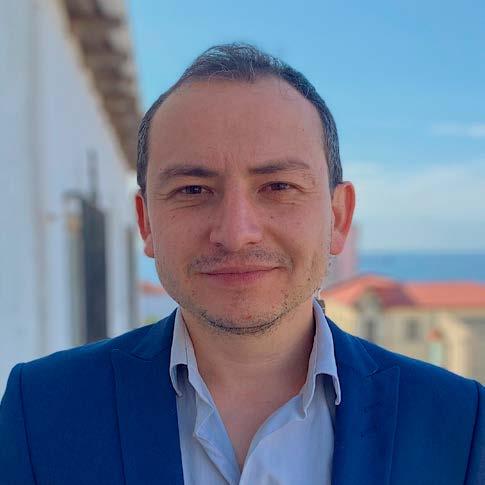
Sergio Galdames,Associate professor
The Universidad de Santiago, Chile (USACH)
Why do people choose a career in education? Why does a leader want to lead a community? Why do people stay in schools? These are questions that have intrigued me for nearly two decades. I've always been curious about how people make personal and professional decisions and their implications for schools, particularly for student learning. In search of these answers,
I embarked on an academic journey, arriving at the Institute in 2015. Four years later, I graduated with a degree, some knowledge, some experiences, some answers, and a lot of new questions.
I cannot deny how fortunate I was to work with Karen Edge and David Godfrey during these years. I had the opportunity to build on Karen’s previous work on generations, adding insights about millennial leaders. As Generation Y matures, my findings are becoming increasingly relevant.
Additionally, I was lucky to have David's
support during the final editing of my thesis; his vision, grounded in direct experience and research, was invaluable. It's rare to have an expert in your field who is also well-versed in Latin American culture. Muchas gracias to destiny for Karen and David.
Reflecting on my journey, with its highs and lows, I mostly remember the good times. From my first course, "What is a Doctorate?" led by the amazing Jane Perryman and Claudia Lapping, to sharing drinks at the IoE bar with some of the most talented minds on the planet, what I treasure most are the discussions with peers, academics, and strangers. Every conversation shaped me into who I am today. I still remember the inaugural session in Logan Hall, September 2015: "The product of your PhD is not your thesis; it is you."
Returning to Chile, I bring this new version of myself into my everyday life. I am now an associate professor at one of the most important universities in Chile, the Universidad de Santiago (USACH). Here, I feel compelled to put these lessons into practice. Currently, I lead the MA in Educational Management and Leadership, where most of my students aspire to become headteachers. I feel humbled by this responsibility and hope that some of the IoE magic reaches these future school leaders.
In addition, I am leading nationally funded research to understand the career decisions of school leaders. I am still interested in why people remain in the same job or organization. I am analyzing quantitative data to understand national career patterns and will soon visit schools known for their retention rates and performance. I hope to contribute to making our schools better places for leaders and teachers.
I have little advice for current and future students, as I believe the research journey should be explored individually. However, I want to highlight two complementary ideas that might help you make the most of the IoE experience:
1. Embrace a Global Mindset: Few places offer a better global experience than the IoE. Sharing a drink and a meal with international scholars, teachers, students, or even strangers was the cornerstone of my educational experience. I especially appreciate my colleagues from Brazil, India, Turkey, Greece, Finland, and Hong Kong. Through their eyes and stories, I visited schools, universities, restaurants, and even intimate moments. So please, share drinks and great food with everyone you meet!
2. Value Collaboration: Building on the global mindset, when you reach beyond your national boundaries and observe the world, you notice common patterns, challenges, and opportunities for teachers, leaders, and schools. Learning from others' successes and failures allows us to find solutions more easily and quickly. I not only keep in touch with colleagues from around the world but also collaborate with many of them on developing ideas and research projects. So, after eating and drinking, do some amazing work together.
If you are interested in learning more about my current work, developing a new idea, or simply chatting about our experiences, please drop me an email at sergio.galdames@usach.cl or check out some of my ongoing work at www.retenciondelideres.cl
School education needs major surgery too.
EdTech. A solution looking for a problem?
The death of ‘differentiation’ and why it matters for inclusion.
New data offers unparalleled insight into pivotal moments of millennials’ lives.
Targeted interventions add five months’ progress for students with SEND.
IOE academics to review national curriculum and assessment as part of new government panel.
IOE Honorary Doctorate awarded to social entrepreneur and computer scientist.
UCL academics awarded European Research Council Starting Grants.
Social segregation increases where primary free schools open.
Girls more anxious about climate change than boys.
Generation UCL: 200 Years of Student Life in London
Up to 8 December 2024, 9:00 am–5:30 pm, Octagon Gallery, Wilkins Building, Gower Street, London, WC1E 6BT. Free to attend.
This exhibition at the Octagon Gallery, Wilkins Building, places students at the heart of its 200-year history. It also marks 130 years since the formation of what became Students’ Union UCL.
Students are foundational to the story of UCL. Established in 1826 as the first university in England outside Oxford and Cambridge, UCL opened up higher education to those who had previously been denied access. This included religious minorities, the middle classes, and later, women. Since the beginning, students have been free to invent their own traditions and forge a distinctive student culture in London. Through this exhibition, we celebrate students' contribution to life at UCL and in London.
Families and relationships in four British cohort studies. 1 October 2024, 1:00 pm–2:00 pm Free to attend.
This webinar highlights some examples of research on families and relationships using the British cohort studies.
It will illustrate a wide range of measures that relate to the characteristics of an individual’s family of origin and own family formation behaviours (household composition, fertility, partnerships, living arrangements, etc.).
It will showcase the value of taking a life course approach and look at changes in family dynamics over time and across cohorts and highlight how it can be effectively combined with other research areas including health and ageing.
Speakers:
Dr Alice Goisis - Associate Professor of Demography and Research Director at CLS Alice also co-leads the Family theme at CLS. Her research interests span a number of substantive areas in social demography and epidemiology with a particular focus on whether and if so how, family processes are associated with children and adult outcomes.
Perceptions of inequality and redistribution decisions. 2 October 2024, 2pm–3:15pm. Masaryk Room, 16 Taviton St, London, WC1H 0BW Free to attend.
In this event, Milena will discuss her project that investigates the effect of social networks on inequality and social cohesion. It investigates how assortativity by wealth (the extent to which individuals observe others with similar/different wealth) and visibility by wealth (the extent to which the rich/poor are more likely to be observed) affect the collectively selected taxation rate under the median-voter rule, the resulting reduction in inequality, and the polarisation of vote decisions.
The findings uncover fundamental limitations to democratic systems and carry implications for political communication and policy.
Speakers:
Milena Tsvetkova - Associate Professor in the Department of Methodology at the London School of Economics.
Her research interests lie in the fields of computational and experimental social science. She employs online experiments, network analysis, and agent-based models to study fundamental social phenomena such as cooperation, contagion, and inequality.
Democratic decision-making in English education: whose voices count?
9 October 2024, 5:30 pm–7:00 pm. Free to attend. Online event.
This panel discussion will explore how responsibilities for school-based education are currently shared and whether we have struck the right balance between national priorities and local concerns. This matters, given the significant role schools play in children’s and families’ lives and the strength of their connection to their local communities.
Speakers: Various
Reimagining higher education: Journeys of decolonising conference 2024. 8 November 2024, 9:30am-6pm, TBC UCL IOE, 20 Bedford Way London, WC1H 0AL £79 registration fee
Nowhere is the phrase “the personal is the political” more resonant than in the journeys to decolonising. This conference will explore the ways in which we can all contribute to and impact journeys of decolonising.
Building on the success of last year’s conference at DeMontfort University, Leicester, this conference welcome abstracts not only from students and academics, but also from colleagues in professional services. Submissions are invited on any aspect of the Decolonisation theme, including:
• Theoretical frameworks for decolonising education
• Practical strategies and case studies from institutions
• The role of students and faculty in driving change
• Policy implications and future directions
• Interdisciplinary approaches to decolonisation
Speakers: Various
Leading into the future: Successful school leadership for sustainable development. 11 November 2024–12 November 2024, 1:00 pm–3:00 pm Park Plaza, 239 Vauxhall Bridge Rd, Pimlico, Victoria, London, SW1V 1EQ £50 registration fee.
Join this event to hear speakers explore the centrality of school leadership in achieving quality education for all students and in connecting SDGs to the day-to-day work and lives of schools.
This event will present the latest thinking, research and school practice to create spaces for high quality dialogue between researchers, teachers, school leaders and key stakeholders from government and non-government agencies in the UK and beyond. It aims to inspire participants and formulate key issues and agendas that are fundamental to improving the quality of education in schools.
Speakers: Various
Multilingual language experiences and the relationship between ADHD and language performance in EFL.
18 November 2024, 6pm-7:30pm
Free to attend. Online event
Attention deficit hyperactivity disorder (ADHD) is related to interactional competence with pragmatic challenges such as frequent excessive talking, difficulty waiting for one’s turn, frequent interruption of others, and seeming not to listen when being talked to directly.
There is a lack of studies investigating the relationship between ADHD and the conversational competence of language learners. Tanja investigates the relationship between multilingual language experiences, ADHD severity as assessed by teachers using the Vanderbilt assessment scale, and speech performance scores using Bishop & Baird’s communication checklist (CC) and English marks.
Speaker:
Tanja Angelovska - Full Professor and Chair of "Research on foreign language learning and teaching" at the Institute for English/American Studies, University of Kassel in Germany
2024 Bright Start international conference: Early years excellence in practice. 22 November 2024–24 November 2024, 5pm-6pm. UCL East, 1 Pool Street, Stratford, London, E20 2AF
Registration fee required
This year's conference theme is 'Empowering change for a sustainable future in early childhood care and education.' This event will feature three dynamic tracks:
• Children aged 0-8 years
• Autism and SEND
• The new voices of children pedagogy™
Submissions are invited in three areas before 30 August 2024:
• The new voices of children pedagogy™ - empowering and amplifying the voices of children aged 3-6 years in daily routines.
• Intergenerational approaches in early childhood education - creating dynamic learning environments that consistently engage grandparents and older family members.
• Early identification and intervention strategies - supporting the early identification of developmental delays or challenges.
Speakers: Various
ECIS Leadership Conference from 03-05 April 2025.
Join us in celebrating 60 years of excellence in international education at the ECIS Leadership Conference from 03-05 April 2025! Set against the backdrop of the stunning state of the art campus at the International School of Stuttgart, this year’s exciting milestone event brings together international school leaders from around the globe to explore the theme of ‘’Human Flourishing’. The five conference tracks are:
• Thriving together: Cultivating Wellbeing
• Leading for tomorrow: a human-centric approach
• Strength in diversity
• Shaping the way the world learns
• Sustainability and global citizenship
ECIS Middle Leader Certificate Courses
Middle Leaders are the change agents of a school; they work with teachers to ensure great learning happens. Effective professional learning builds on the competencies of Middle Leaders to support their roles and responsibilities within the context of their schools. ECIS provides a variety of courses designed to enhance the leadership abilities of Middle Leaders. Upon successful completion of four courses, participants will be awarded an ECIS MLC certificate.
ECIS School Membership.
Alongside our courses, ECIS provide free webinars or a wide range of subjects. Explore some of these on the "events page" of the ECIS website.
Bilan Yusuf - Programme Administrator, MA Educational Leadership (Publishing and Marketing)
Steve Seo- Student on MA Applied Educational Leadership, UCL (Infographic Designer) Moustapha Bennadi - Marketing and Communications Co-ordinator, UCL (Magazine Designer)



